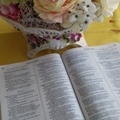These thoughts were part of a series of Easter reflections prepared for, and by, members of Horley Baptist Church during April 2020. This reflection is based on Mark 14 v32-46
I wonder, if you were asked to recall something that you knew you had to face, that you were dreading so much that it made your stomach churn and your knees buckle, what thoughts and emotions would assault your senses. We’ve all been there, haven’t we – that exam you’ve been worrying about; a visit to the doctor you keep putting off because you are frightened of the possible outcome; that meeting with the bank manager about your mortgage; that dentist appointment, that … …
The worry and the dread of whatever it is seems to be unbearable.
* * * * * *
Jesus had just been sharing the last supper with the disciples when, later, He took Peter, James and John with Him to the Garden of Gethsemane to pray, because He knew that the hour of His death was now very close. “My soul is overwhelmed with sorrow to the point of death”, He said to them. “Stay here and keep watch.”
I wondered why it was the Garden of Gethsemane, and if we look at the same account in Luke’s gospel, he tells us that “Jesus went out as usual to the Mount of Olives” (where the Garden of Gethsemane was located at the base of the Mount). Surely, this is the first place that His captors would look for Him, the place he usually went to. But He still went to that place, indicating that He knew the path that He must take, as it was all part of the plan.
The Garden of Gethsemane (in Hebrew known as “Oil Press”) was also full of olive trees. Oil was extracted from the olives by use of an oil press (still in use today in some places), which would create such immense pressure that the oil would seep out and become separated from the vegetation water and the solid material. What a picture those trees paint for us of the pressure that fell upon Jesus on that fateful night as He anticipated what was to come. So great was His distress, that Luke’s account portrays that “being in anguish, He prayed more earnestly, and his sweat was like drops of blood falling to the ground”. He even prayed to the Father, that perhaps there was another way, pleading that this cup might pass from Him. “Yet not my will, but yours be done”, He said. Why did He want this cup to pass from Him? What exactly was this cup? It was the cup of God’s wrath, that should have been yours and mine to drink, but instead would be poured out on the Son, as the Father turned His face away.
Just pause at this point and consider what Christ endured for each one – such raw humility and vulnerability, such great agony and the dread of God’s wrath. And yet He did not run away, and even showed concern for the disciples who, despite the situation before them, kept falling asleep instead of keeping watch. Gethsemane is, then, a picture of how Christ shared in the human condition – anguish, alienation, sadness and death. This is why we know He comes alongside us in our suffering – he understands, because He suffered so greatly in this garden, anticipating the road ahead. He was literally pressed and crushed by the very thought of what He must face.
Someone said recently, “Humility is strength”, and never more so was this demonstrated than in the Garden of Gethsemane and the events thereafter. If Jesus had not humbled himself, allowed himself to be the most vulnerable that He could possibly be, the course of mankind would forever have changed and been lost for eternity. And in that, is strength! I admit to feeling quite sad as I wrote this, but I too am humbled by remembering what happened, realising afresh just how much God loves me, how much He loves you. We must never forget what Jesus went through, but praise God, the Garden of Gethsemane was soon to be replaced with the empty tomb – hallelujah!
But that’s for another day.
~~~~~~~~
Contributed by Lesley Edwards; © Lesley Edwards
